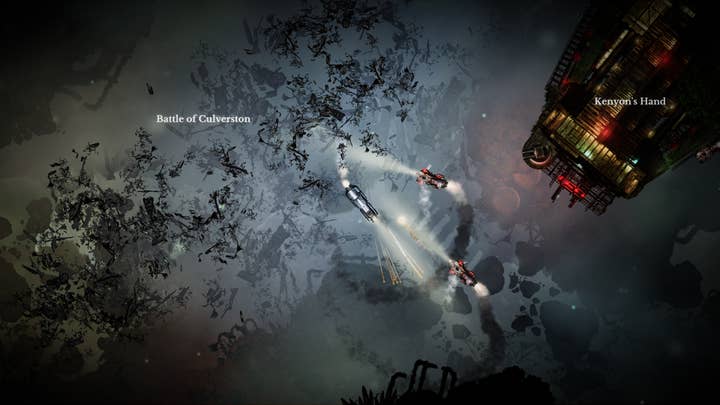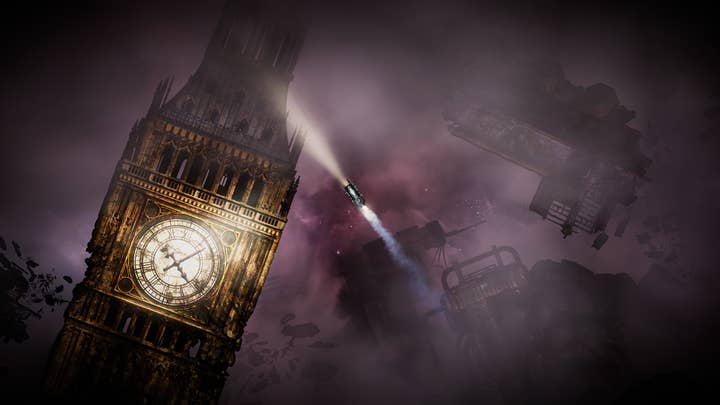Failbetter's final push to ensure Sunless Skies flies at launch
One year on from disappointing Early Access sales, the Fallen London studio is gearing up for a confident launch
A little under a year ago, Failbetter Games hit a bump on the road to its next release.
The Early Access version of Sunless Skies -- the third adventure in its Fallen London fictional universe -- had sold just 15% of what its predecessor, Sunless Sea, had managed. The studio ended up laying off staff, and its Fundbetter Games initiative (helping to finance more narrative titles) was retired.
At the time, Failbetter assured that it was "in no danger of failing to deliver Sunless Skies, and never have been", but there was no denying this was a downturn in the studio's fortunes.
"The trouble with Early Access as a funding mechanism is once you've sold a copy, you've made a promise to give someone a complete game"
Adam Myers, Failbetter Games
Today, Sunless Skies finally leaves Early Access and when we met with the developers earlier this month, the mood was much more buoyant.
Speaking to GamesIndustry.biz, CEO and art director Paul Arendt and deputy CEO Adam Myers say the decision to retire Fundbetter had been made months before. The layoffs, meanwhile, were limited to a handful of employees -- and this was largely out of recognition that Failbetter wasn't big enough to manage two in-development titles, plus its Fallen London browser game, as it had been attempting to do. Better instead to concentrate its resources on improving Sunless Skies.
And while those Early Access sales were disappointing, Myers is keen to stress Failbetter has "never been reliant on [them] to fund development."
"The trouble with Early Access as a funding mechanism is once you've sold a copy, you've made a promise to give someone a complete game that matches the description of what it was going to be," he says. "Valve encourages developers to not be too specific with what they're going to do, but people who buy Early Access games will often be able to tell what the game doesn't have yet that it needs to be finished, and you've got to meet those expectations."
He adds that whether a sale happens midway through Early Access or at launch doesn't matter to Failbetter -- at least, financially -- but concentrating as many sales around the latter will help build momentum and attract the attention of more people.

"People notice things doing well, notice games they've heard about multiple times in a few weeks and start thinking about whether they might be interested in it," says Myers. "If you spread sales over the year, you don't get that amplification."
He also reports things are already looking up, as sales over time compared with Sea have "gradually trended upwards" which is "definitely heartening". But for the past year, the studio has been focused on pushing for gamers to add Sunless Skies to their wishlist, rather than compelling them to buy in Early Access. The focus around launch should ultimately benefit the game in the long run, and help Failbetter reach an audience beyond the core fans that are already familiar with the series.
"Wishlists and follows have been a really good tool for us to build towards a strong launch," says Myers. "There's some data available that makes it possible to do rough predictions as to what those might turn into when you launch. They don't have as much certainty as an actual sale, of course, but you're not completely in the dark about what's going to happen."
He goes on to add that wishlists never convert 100% to sales, but the average stats on Steam for such conversion "are not at all trivial" -- in fact, Sunless Sea managed to convince 35% of users who wishlisted it to buy the final product.
The challenge, of course, is that convincing someone to be interested in a title -- enough to add it to their wishlist -- and convincing them to buy it are two entirely different things. Arendt acknowledges this, but says Failbetter isn't relying on stores alone to remind people why they were interested.
"As we approach launch, review embargoes lift and we do interviews," he says. "Suddenly we're briefly in the public eye again. At the same time, Steam or GOG are saying 'hey, you wishlisted this game'. So it's reliant, to a degree, on positive coverage and word of mouth at launch but I hope we'll get there.
"I wouldn't want to overstate the wishlist thing. It's definitely partly about that, but it's also about awareness that this is a thing that's coming, rather than a call to action, 'buy now'."
"We always know we're getting there when people do first-person reviews about their catastrophes."
Paul Arendt, Failbetter Games
Another crucial decision that improved the game's outlook came in the summer, when Failbetter decided to delay the game to January 2019. While this was no doubt disappointing for Kickstarter backers, it has enabled Failbetter to really dive deep into what wasn't resonating with potential players last year.
"We didn't need to hold off until January, but we had a release date of September and after that the big guns come crashing in and the chance of getting any type of attention is just miniscule," says Arendt. "Whereas we're now heading into this nice quiet period and hopefully people will pay attention.
"It also gave us the chance to revisit stuff we wanted to get right. It was a hard decision to make, but I think it was the right one. The intervening times allowed us to do a lot of things, but a few really fundamental things."
One was fixing the user interface -- not the most exciting part of the game, Arendt admits, but given the game is heavily driven by narrative, there's a lot of reading involved. Failbetter found the reading experience wasn't quite as satisfying as they'd hoped, with players skipping through the text but (as Sunless Sea and Fallen London fans will know) the writing is part of what makes Failbetter's games unique.
Secondly, Failbetter was able to apply level design lessons learned in the later areas to the starting region. Sunless Skies is split into various different regions, and originally the opening area has been quite open. This left players with choice paralysis and didn't encourage them to seek out the best stories, so the team redesigned it to be a little more curated.

Thirdly, it reworked the survival mechanics and the surrounding narrative to ensure players were more engaged. Sunless Skies sees you piloting a flying steam locomotive through a Victorian Gothic vision of the heavens, battling pirates and salvaging wrecks in between ports, where you can participate in quests and trading. As you travel, your engine consumes fuel and supplies -- let them get too low, or encounter challenging encounters, and the crew's terror level will rise, which will influence the way your story pans out.
A year ago, Failbetter realised these mechanics "weren't doing enough to generate good anecdotes", with Myers adding: "The best moments people have in our games are often the ones where the carefully authored content interacts with the game mechanics to produce a narrative that feels heavily tailored to the individual experience, that's unique to your playthrough. Those are the things people will get excited about and talk about in the Steam reviews and so on."

Arendt agrees: "We always know we're getting there when people do first-person reviews about their catastrophes."
Generally, Failbetter's games tend to be quite dark. Rather than gameplay loops that always amount to constant progress, players can find they often end in disaster, losing a lot of progress and having to start again with a new character. It sounds like a deterrent, but Failbetter has found if it can tune that 'anecdote generation' so those disasters are "fair consequences of their own decisions", players found it more enjoyable.
"There are lots of specific choices that we've used to try generating more of those stories because we think that's where the fun is," says Myers. "For instance, if the player is doing pretty well at keeping their terror low, some of the options when dealing with terror events can actually make your situation significantly worse in exchange for some sort of benefit.
"We sort of tempt them with profits to get them to bring themselves closer to the line. Sometimes players will win that gamble, they'll get a nice big payoff and be able to keep the survival situation under control. But sometimes it will be the first or second step of spiralling disaster, which they may come back from or not. Playing off greed against incentive -- delaying the game a bit gave us a lot of opportunities to do more with that, and I think it's worked out very well."
Another challenge Failbetter faced was ensuring the team remained enthused about finishing Sunless Skies. No matter how few people they affect, layoffs are never an encouraging sign from your employer, nor are admissions that sales and finances are behind where you had hoped they would be.
Even so, the developers remained confident about the game's potential, the community remained supportive, and the senior team ensured a good work/life balance that did not burn people out as they approached launch.
"We generally try to be above and beyond the call of decent employers," says Arendt. "We avoid as many of the traps of the games industry as we can. We've managed to get to this point with a minimum of overwork."
Myers adds: "We're very determined to eliminate all systemic causes of overtime. We have seen a few people where it's hard to stop their enthusiasm, they always want to do additional stuff as we approach launch."
Arendt laughs: "Yeah, we've basically constantly telling people off and telling them to go home. So I think that helps. I feel like the team has faith in us -- they certainly demonstrated that in the months after that."


